Posté par Olivier Bonfait, le 28 février 2025;
- Date limite : 24 mars 2025
Journée Wikimédia culture et numérique 2025 (Paris, 16-17 Jun 25)
Paris, INHA, Jun 16–17, 2025 Deadline: Mar 24, 2025
Les journées Wikimédia culture et numérique sont un rendez-vous annuel rassemblant les professionnels des GLAM (galeries, bibliothèques, archives, musées) contributeurs ou intéressés par les projets Wikimédia (Wikipédia, Wikimedia Commons, Wikisource, Wikidata, etc.).
Depuis 2019, cet évènement permet à la communauté professionnelle d’échanger sur les bonnes pratiques de contributions aux projets Wikimédia et de dissémination en ligne, sous licence libre, de leurs collections.
Les journées Wikimédia culture et Numérique sont aussi l’occasion de débattre, de réfléchir collectivement aux évolutions des compétences métiers à l’ère numérique et de rencontrer des contributeurs bénévoles aux projets Wikimédia. Au cours de conférences, tables rondes et ateliers pratiques, les intervenants offrent aux participants . . . → En lire plus
Posté par Olivier Bonfait, le 30 octobre 2024;
- Date limite : 11 nov. 2024
The Art Museum in the Digital Age – 2025 (Vienna/online, 20-24 Jan 25)
Online (Zoom) / Belvedere 21 (Wien), Jan 20–24, 2025 Deadline: Nov 11, 2024
The seventh edition of our conference series is dedicated to the ethical and social implications of the digital transformation in museums. Digital technologies present both opportunities and challenges. For example, museums can use digital media to make their collections accessible to a wider audience and create interactive experiences. At the same time, however, they must also take into account matters of data security, copyright, and cultural representation. In this context, digital humanism in museums refers to the integration of digital technologies and methods into museum practice to improve the understanding and accessibility of cultural heritage. This approach aims to bring human values and social . . . → En lire plus
Posté par Olivier Bonfait, le 25 octobre 2024;
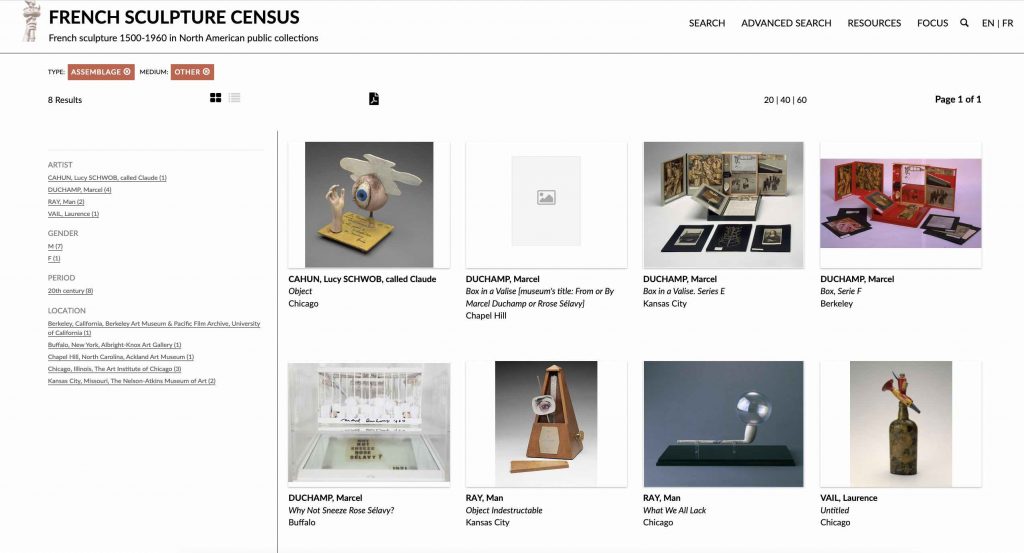
Une base sur les sculptures françaises aux États-Unis : le French Sculpture census (https://frenchsculpture.org/)
Depuis la visite de Houdon en Amérique en 1785 et la réalisation de son Portrait du Général Washington (Richmond),depuis le don par la nation française de la Statue de la Liberté à l’Amérique en 1886, la sculpture française occupe une place particulière aux Etats-Unis. Le Répertoire de sculpture française dans les collections publiques américaines (1500-1960) révèle pour la première fois l’étendue et la richesse de ce corpus d’œuvres. Il a permis et continuera de permettre la découverte de nombreuses œuvres disséminées à travers l’Amérique, dans des lieux . . . → En lire plus
Posté par Olivier Bonfait, le 13 octobre 2024;
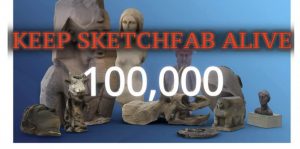 Le site de visualisation 3D sur internet sketchfab a été vendu et tous les modèles tridimensionnels vont être transférés à une société de jeux qui par la suite fermera l’ajout de modèles et les commentaires. Le site de visualisation 3D sur internet sketchfab a été vendu et tous les modèles tridimensionnels vont être transférés à une société de jeux qui par la suite fermera l’ajout de modèles et les commentaires.
Plusieurs milliers de modèles 3D en architecture, histoire de l’art et archéologie vont disparaître et cela constitue une perte pour la recherche et l’éducation.
Pour signer la pétition : https://chng.it/7b72S7HtxJ
Voici une traduction du texte d’Emily Esser : « Keep Sketchfab Alive: Preserve Open Access To 3D Museum Collections ».
Depuis sa création, Sketchfab.com, un site web de partage de modèles 3D, a rempli la fonction inestimable d’héberger . . . → En lire plus
Posté par Olivier Bonfait, le 15 mai 2024;
- Date limite : 1er juillet 2024
Seeking Nuance: Articulating Digital and Non-digital Approaches to Art History. Artl@s Conversation Series in Digital Art History
Following the success of our 2023-2024 seminar « Narrowing the Divide, » we are delighted to announce the call for proposals for the 2024-2025 Artl@s Conversation Series in Digital Art History, themed « Seeking Nuance: Articulating Digital and Non-digital Approaches to Art History. » This online seminar aims to delve into the interplay between digital and analog practices in art historical research, regardless of the scale of the project, be it individual or collective.
We invite scholars to showcase how their projects navigate the complexities of digital and analog methodologies and practices. These may encompass considerations such as balancing quantity and quality, supplementing computational evidence, managing collaborative skills, ensuring project diffusion . . . → En lire plus
Posté par Olivier Bonfait, le 10 mai 2024;
- date et lieu du séminaire : 15 mai 2024, MAP MAACC ENSA Paris La Villette, salle de séminaire, 23 rue des Ardennes, 75019, 15 mai 2024, MAP MAACC ENSA Paris La Villette, salle de séminaire, 23 rue des Ardennes, 75019
Restitutions 3D : Méthodes, questions de recherches, enjeux publics Séminaire MAP MAACC ENSA Paris La Villette, salle de séminaire 23 rue des Ardennes, 75019 15 mai 2024 Journée organisée par Olivier Bonfait, François Guéna, Frédérique Bertrand, Matthieu Lett
Accueil par François Guéna
Atelier 1 Plafond-3D et le digital : présentation des travaux de Plafond-3D en cours – 9h-9h15 Matteo Burioni : Plafonds peint et reconstitution 3D. Enjeux de la recherche – 9h15 Mona Hess : State of the research : Ansbach Residenz, Rheinsberg Castle, Palais im Grossen Garten in Dresden – 10h Olivier Bonfait, François Guéna : La restitution de la grande galerie de Choisy 10h15-10h45 : discussion Pause café – 11h Olivier Bonfait, Matthieu Lett, François Guéna, Frédérique Bertrand : Restitution de l’escalier des Ambassadeurs de Versailles : état . . . → En lire plus
Posté par Olivier Bonfait, le 15 avril 2024;
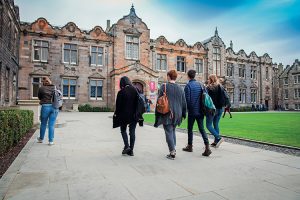 PhD Scholarship in Digital Art History at the University of St Andrews PhD Scholarship in Digital Art History at the University of St Andrews
Application deadline: May 6, 2024
`The School of Art History is offering a scholarship for doctoral research in digital art history and digital-born art for starting in September 2024.
We welcome research proposals that employ or critically examine the applications of digital practices, methodologies, and tools in the fields of art history, museum and heritage studies, or the history of photography. Potential subjects include, but are not limited to:
Data visualisation Text mining Network analysis Digital mapping and GIS 3D digitisation and modelling Augmented/Virtual reality AI and computer vision Digital . . . → En lire plus
Posté par Olivier Bonfait, le 1 février 2024;
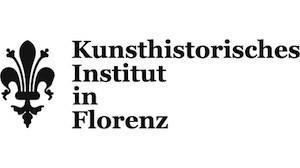 Academic Position in Digital Humanities, KHI, Florence Academic Position in Digital Humanities, KHI, Florence
The Digital Humanities Lab at the Kunsthistorisches Institut in Florenz – Max-Planck-Institut (KHI) invites applications for a pre-doctoral or post-doctoral researcher to join the interdisciplinary team. Deadline for Applications: 16th February 2024. To apply for this position, please visit: https://apply.khi.fi.it/.
The Digital Humanities Lab integrates innovative research methodologies in an open approach to the fields of art history, humanities in general, and computer science.
Founded in 1897, the KHI is dedicated to the history of art and architecture in a transcultural and global perspective. It promotes methodologically innovative research, which looks to the future of the discipline and combines historical approaches with . . . → En lire plus
Posté par Olivier Bonfait, le 3 janvier 2024;
- Dates du congrès : 15-19 janvier (par visio)
The Art Museum in the Digital Age (online/Vienna, 15-19 Jan 24)
Online (via Zoom) / Belvedere 21 (Wien), Jan 15–19, 2024
The Belvedere Research Centre is delighted to present the sixth edition of its conference series on the digital transformation of art museums. The international conference builds upon the previous event focusing on topics such as Metaverse, Web 3, and Artificial Intelligence. Unsurprisingly, however, the debate about the responsible use of AI in the museum sector is omnipresent in the contributions submitted this year in particular. Four online sessions, an on-site workshop and a hybrid panel discussion are dedicated to the critical examination of machine learning versus human curation, the digital networking and aggregated analysis of cultural heritage data, and immersive experiences in the interplay of virtuality . . . → En lire plus
Posté par Olivier Bonfait, le 3 janvier 2024;
- Date limite : 15 janvier 2024
Computer Vision and Art History Today (Philadelphia, 14-15 Jun 24)
Philadelphia, PA, USA, Jun 14–15, 2024 Deadline: Jan 15, 2024
The Department of Art History and the College of Information Sciences and Technology at The Pennsylvania State University are pleased to announce an upcoming convening on the use of computer vision (CV) for art historical research. Structured as a symposium with a public keynote, this event will take place June 14 & 15 at the Barnes Foundation in Philadelphia. The keynote lecture, to which all are invited, will be delivered by Leo Impett (University of Cambridge) on Friday, June 14 at 6 pm. Scholars wishing to attend the symposium scheduled for Friday and Saturday morning are invited to indicate their interest as explained . . . → En lire plus
Posté par Laurence Terrier, le 22 décembre 2023;
Base de données MedFrameS : la sculpture monumentale des portails des XIIe et XIIIe siècles
Le cadre médiéval de la sculpture monumentale des portails : socles, dais, niches (XIIe-XIIIe siècles)
https://app.ls-prod-server.dasch.swiss/project/0116Terrier Aliferis, L, Acosta, L., Ciardo, S., Rivoal, M., 2023, MedFrameS [database](DaSCH), https://meta.dasch.swiss/projects/0116/L’objectif de cette base de données est de présenter des photographies détaillées ainsi que des descriptions complètes des éléments sculptés entourant les statues des ébrasements des portails des XIIe et XIIIe siècles. Cette base de données a été créée et développée entre 2019 et 2023 dans le cadre du projet MedFrameS financé par le Fonds national suisse de la recherche scientifique (FNS) « Le Cadre Médiéval de la Sculpture Monumentale des Portails (Socles, Dais, Niches) : Transferts Culturels et Agencements (XIIe-XIIIe siècles) ». Elle documente des portails . . . → En lire plus
Posté par Olivier Bonfait, le 15 octobre 2023;
- Date limite : 20 nov. 2023
Call for Papers: Do we really need Digital Art History? We are seeking contributions for the second semester of the Artl@s /Visual Contagions Conversation Series on Digital Art History (2024).
The field of Digital Art history (DAH) is currently experiencing a notable shift towards establishing its autonomy as a distinct discipline. However, its survival is challenged by the limitations of its investigations. The lack of relationships between computational effort and traditional analysis often limits the generation of novel insight. DAH risks becoming a mere spectacle when it relies solely on stunning visualizations without engaging in rigorous research questions. Conversely, art history limits itself from harnessing robust methodologies by disregarding computational approaches.
The digital approach increasingly demands advanced technical skills, thereby often placing art historians in a position where . . . → En lire plus
Posté par Olivier Bonfait, le 15 octobre 2023;
 Base de données : La collection d’art de l’Académie royale de peinture et de sculpture Base de données : La collection d’art de l’Académie royale de peinture et de sculpture
Le DFK Paris a le plaisir de présenter la base de données de la collection d’art de l’Académie royale de peinture et de sculpture : https://www.dfk-paris.org/fr/page/academie-database-3846.html Basée sur les inventaires de Nicolas Guérin (1715) et d’Antoine-Nicolas Dezallier d’Argenville (1781), la base de données répertorie 653 peintures, sculptures, estampes et plâtres rassemblés par l’Académie royale de peinture et de sculpture au cours de son siècle et demi d’existence (1648-1793). Elle établit leur localisation actuelle et leur emplacement dans le Louvre au XVIIIe siècle. La base de données . . . → En lire plus
Posté par Centre Dominique-Vivant Denon, le 25 septembre 2023;
- Date et lieu de la conférence : Mercredi 27 septembre à 18h, Louvre inscription obligatoire
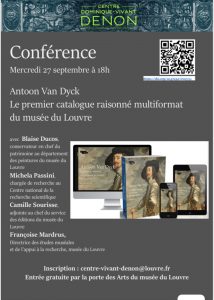
Mercredi 27 septembre à 18h – Antoon Van Dyck. Catalogue raisonné des tableaux du musée du Louvre
Le musée du Louvre publie pour la première fois un catalogue raisonné en version papier et numérique, l’occasion de revenir sur l’histoire de cet outil et son avenir éditorial. Échange entre l’auteur, Blaise Ducos, conservateur en chef du patrimoine au département des peintures du musée du Louvre, Camille Sourisse, adjointe au chef du service des éditons du musée du Louvre et Michela Passini, historienne de l’art, chargée de recherche au Centre national de la recherche scientifique (CNRS).
Entrée gratuite par la porte des Arts et sur inscription: centre-vivant-denon@louvre.fr
Posté par Noémi Duperron, le 22 juin 2023;

Bonne nouvelle, l’Université de Yale a mis l’ensemble de ses collections en ligne et en libre accès!
La plateforme donne accès à des millions d’enregistrements d’objets, de personnes, de lieux, de concepts et d’événements présents dans les riches collections de Yale. Les collections des musées (peintures, sculptures, estampes, etc.), des archives et des bibliothèques de Yale sont accessibles d’une nouvelle manière et en un seul endroit:
https://lux.collections.yale.edu/
Posté par INHA, le 15 juin 2023;
- Date de la journée d'études : 21 juin 2023, 09:00 - 17:30, INHA, Galerie Colbert, auditorium Jacqueline Lichtenstein
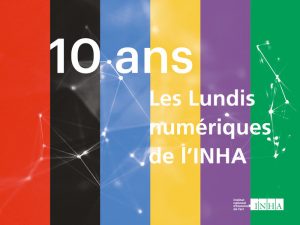
Visuel des 10 ans des Lundis numériques de l’INHA
La notion de temporalité dans les projets numériques en histoire de l’art et archéologie sera le sujet de cette journée d’étude organisée à l’occasion des 10 ans du cycle de séminaires des « Lundis Numériques de l’INHA ». Celle-ci permettra à la fois d’analyser les évolutions des projets présentés depuis une décennie, d’interroger leurs devenirs, mais aussi de réfléchir plus largement à la façon de penser aujourd’hui la pérennité des projets numériques. La journée s’articulera autour de quatre axes qui seront discutés dans des forums . . . → En lire plus
Posté par Olivier Bonfait, le 14 février 2023;
- Date limite : 27 février 2023, 27 février 2023
Getty Summer Institute: The Museum in a Digital World (Vienna/Krems 4-15 Sep 23)
In September 2023, the Belvedere Research Center in Vienna and the Center for Image Science at the University for Continuing Education in Krems will jointly host an international summer institute sponsored by the Getty Foundation in Los Angeles.
ABOUT THE PROGRAM “The Museum in a Digital World: Strategies – Methods – Tools” is a ten-day training program dedicated to the topics of digitization, digital collection management, and online presence of digitized collections to address their potentials and problems. How are museums facing the challenges and changes brought about by the all-encompassing arrival of the digital? How is the digital transformation affecting traditional museum strategies? The Summer Institute, supported by the Getty Foundation, offers a unique combination of . . . → En lire plus
Posté par Olivier Bonfait, le 30 janvier 2023;
- Date et lieu : mardi 14 février, 18h-20h30, INHA, Salle Vasari, mardi 14 février, 18h-20h30, INHA, Salle Vasari, mardi 14 février, 18h-20h30, INHA, Salle Vasari
 La grande ménagerie des données : l’édition numérique enrichie des « papiers Barye » La grande ménagerie des données : l’édition numérique enrichie des « papiers Barye »
Les éditions numériques de sources, qu’elles soient iconographiques ou textuelles, figurent actuellement parmi les enjeux majeurs des sciences humaines. Les procédés accompagnant leur élaboration soulèvent, pour la discipline de l’histoire de l’art qui se confronte intensément aux images, de nombreuses questions d’ordre à la fois technique, scientifique et épistémologique. Cet événement permettra de faire le point sur les travaux récents menés à l’INHA, qui croisent les compétences d’historiennes et historiens de l’art à celles d’ingénieurs de recherche ; tout en les recontextualisant de manière plus globale au sein . . . → En lire plus
Posté par Olivier Bonfait, le 13 janvier 2023;
- Date limite : 28 février 2023, 28 février 2023
Panofsky Fellowship 2023 | Extended Worlds: Contemporary Art and Digital Technologies: Virtual, Augmented, Mixed Reality

Prof. Dr. Andrea Pinotti, Milan, will hold the Panofsky Professorship at the Zentralinstitut für Kunstgeschichte Munich in 2023. In connection with this professorship the Zentralinstitut für Kunstgeschichte seeks applications for a Panofsky Fellowship.
The fellowship is intended for doctoral students and postdoctoral scholars (who have graduated within the last five years) who are working on a project related to the topic “Extended Worlds: Contemporary Art and Digital Technologies: Virtual, Augmented, Mixed Reality”. Fellows are expected to maintain a presence at the ZI, to present the Fellowship project, and to partake . . . → En lire plus
Posté par Olivier Bonfait, le 2 janvier 2023;
- Date limite : 10 janvier 2023, 10 janvier 2023
Luigi Vanvitelli, the Maestro and his heritage 1773-2023.
The year 2023 marks the 250th anniversary of the death of architect Luigi Vanvitelli, who conceived the majestic design of the Royal Palace of Caserta and the new capital of the Kingdom of Naples, interpreting the dream of King Charles of Bourbon, who wished to represent the prestige of a great monarchy in Europe.
Following the General Manager’s Decree no. 41 prot. n. 2827 of 29 March 2022, the various facets of the celebratory project « Luigi Vanvitelli, the Maestro and his heritage 1773-2023 » were approved.
One of the main activities of the project includes an international call for papers aimed at investigating and bringing to light the artistic personality and genius of Luigi Vanvitelli in . . . → En lire plus
|
Équipe Rédacteur en chef : Olivier Bonfait.
Rédacteurs : Elliot Adam (Moyen Age) ; Nicolas Ballet (XX-XXIe siècles) ; Matthieu Fantoni (musées) ; Antonella Fenech Kroke (bourses) ; Vladimir Nestorov (Lettre mensuelle)
Administrateur web : Matthieu Lett.
ancien éditeur : Pascale Dubus
anciens rédacteurs : Gautier Anceau, Sébastien Bontemps, Damien Bril ; Sébastien Chauffour ; Ludovic Jouvet ; Aude Prigot
|










